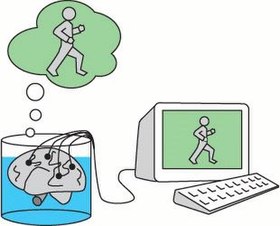Write4U
Valued Senior Member
Actually they do count as well as talk to each other, they just are not aware they do. But they can sense quantity and respond chemically when critical number has been reached, then they all respond in unison. Hence the term "quorum sensing".My understanding is that their behaviors can be described in mathematical terms, but bacteria can't ''practice'' math. No 's' in practice!
It is a practical behavior based on chemical sensing of critical quantity and is certainly the unconscious practice of mathematical quantity sensing.
I view it as similar to a proto hive-mind in insects which came a few evolutionary steps later in the evolution of conscious intelligence. Come to think of it, What is evolution but a form of mathematical refinement of properties by natural selection.
Skills are the refined functional application of mathematical principles......
And they seldom make mathematical mistakes, seems. Of course they don't know this or get graded. Response behavior to mathematical values and functions are naturally emergent phenomena.In that sense of actually learning...
I think it's cool that quarks learnt to make other particles in a much shorter time.
IMO, self-assembly into specific patterns is a mathematical skill, conscious or not. Does it need to be conscious as long as the activity results in the expression of a mathematical pattern?
People always associate practising mathematics as a deliberate activity. Why MUST it be so?
If we can identify and codify a naturally occurring phenomenon as "mathematical", why should it not be "mathematical" in essence?
The solar system is a mathematical pattern, governed by natural mathematical laws and acting in a consistent regular pattern of behavior. Planets don't know they orbit the sun, yet they do, with remarkable precision.
They are mathematical patterns.

Don't know about insects.
A few billion years of evolution has resulted in sentient intelligent man, able to consciously invent and practice mathematics . What about all the missing links, the intermediate steps we are so fond of citing when someone asks how one species can evolve into another species?
To assert that evolved mathematical abilities is an intelligent design without evolutionary precursors is teological woo, IMO
I can see a clear evolutionary path from unconscious natural chemical responsive behaviors to the eventual conscious practice of mathematical functions, including inventing new chemical substances. Ask Big Pharma.
Last edited:

 Whether Tegmark wants to admit it or not, he sounds like a pantheist. If he could separate his philosophical opinions of the universe, from his passion for math, he might not offend mainstream scientists. Not sure why he feels the need to marry the two.
Whether Tegmark wants to admit it or not, he sounds like a pantheist. If he could separate his philosophical opinions of the universe, from his passion for math, he might not offend mainstream scientists. Not sure why he feels the need to marry the two.